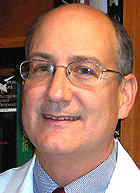Daniel Kelly, M.D., has been named director of the Division of Cardiovascular Diseases in the Department of Medicine.
Kelly is the Alumni Endowed Professor of Cardiovascular Diseases and professor of medicine, of pediatrics and of molecular biology and pharmacology and a cardiologist at Barnes-Jewish Hospital.

An internationally renowned physician-scientist noted for his innovative investigations into the molecular basis of cardiac disease, Kelly has focused his research on the regulation of cellular fatty acid and mitochondrial metabolism, or how the heart obtains energy to function.
He also studies the cardiovascular effects of metabolic disorders such as diabetes, and has established an interdisciplinary group to develop better ways to prevent and treat heart disease in diabetic patients.
Kelly heads the Center for Cardiovascular Research and has been co-director of the cardiovascular division since 2002.
He has made contributions to scientific literature with more than 100 publications and has extensive research support through the National Institutes of Health.
He succeeds Michael Cain, M.D., who will become dean of the School of Medicine and Biomedical Sciences at the State University of New York University at Buffalo.
“Dr. Kelly brings a broad scientific perspective to this position and will emphasize the translation of advances in basic cardiovascular research into advances in care of patients with heart and vascular disease,” said Kenneth Polonsky, M.D., the Adolphus Busch Professor and head of the Department of Medicine. “We are very fortunate that a scientist with his distinction will be assuming leadership of our cardiology division.”
The cardiovascular division is the largest division in the Department of Medicine, with more than 80 clinical and research faculty members. It has clinical programs at Barnes-Jewish Hospital; in suburban St. Louis; in Rolla, Mo.; and at various locations in Illinois.
Its research programs cover a broad range of interests, from basic laboratory investigations into the cellular and molecular basis of heart and vascular disease to strong programs in cardiac imaging and nanotechnology, as well as substantial involvement in patient-oriented research.
The division’s annual revenue from research grants exceeds $18 million.